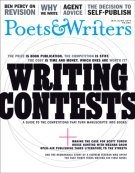To submit a question for the next featured agent, e-mail agentadvice@pw.org or write to Editor, Poets & Writers Magazine, 90 Broad Street, Suite 2100, New York, NY 10004. Questions accepted for publication may be edited for clarity and length.
 Areas of interest: Literary fiction, narrative nonfiction, journalism/investigative reporting, memoir, pop culture, graphic novels
Areas of interest: Literary fiction, narrative nonfiction, journalism/investigative reporting, memoir, pop culture, graphic novels
Representative clients: Samantha Hunt, Sarah Manguso, Dinaw Mengestu, Ed Park, Andrew Rice, Craig Thompson, and Josh Weil
Looking for: Query letters
Preferred contact: Postal mail
Agency contact:
Janklow & Nesbit Associates
445 Park Avenue
New York, NY 10022
(212) 421-1700
www.janklowandnesbit.com
About three months ago, I sent a synopsis of my novel as well as a cover letter to six literary agents whom I researched and found to be interested in the kind of fiction I write. I haven’t heard from any of them and I’m wondering when I should follow up with queries about my proposal. I don’t want to be pushy, but at the same time, life’s short.
Andy from San Francisco
It’s fair to follow up with them if you haven’t heard back after six weeks; it’s likely an oversight. Send an e-mail that says you are checking in to see if they had a chance to consider your query and that you look forward to hearing from them soon. Be emotionally detached, and don’t take it personally. If you don’t hear from them, move on to other agents. Your letter may be in a pile on an overwhelmed assistant’s desk, or stuck in his e-mail inbox or in his desk drawer. Or it’s in a stack the agent intends to get to, and feels guilty about not addressing more quickly. Unfortunately, most agents do a kind of triage on the volume of material that moves through their office—but most of them take queries seriously.
What do you look for in a query letter? How much do you need to know about plot versus potential marketing tactics in order to make the decision to request a partial manuscript?
Luke from Nashville
Here are the things I look for in a query letter: a distinct pitch, a short tease of the plot (set up the story and make me want to read more), and a comprehensive bio. I take notice if it’s a referral, or when a query suggests the author knows the kinds of books I handle. I prefer a short, clear letter rather than one that is overwritten or opaque. By which I mean, get to it: Know how to talk about your work succinctly. And, in general, keep it to one book per pitch. When I read a query, I am going with my gut in deciding if I want to see more material. There’s no real trick. Your pitch may remind me of a novel I loved, or one I couldn’t sell, or something I recently read and passed on, or one I wished I had represented.
I don’t care as much about an author’s explaining the potential marketing strategy, and don’t need quotes from friends and family or workshop or conference readers about how much they love your writing. As for the bio, I admit I am partial to queries that show some publishing history, that the writer has done the groundwork of sending writing out and getting it picked up by journals or magazines. This is especially true of short story writers. It’s not mandatory (though it almost is for nonfiction), but it’s nice to know, when considering someone’s submission, that the editor of a magazine, journal, or Web site also thinks the writer is doing good work. Still, agents want to discover something exciting, and I’m always up for being surprised.
Lastly, some turnoffs: jokey queries; queries written by hand; stationery that features images of quills and ink pots and books; e-mail queries with hundreds of agents in the “To” field; e-mail queries sent from companies that solicit agents on behalf of writers; queries that describe the work as “a fictional novel”; and especially that spam query I received almost every day for six months about a novel called “Elizabeth.” Also arrogance. And desperation. Just be confident in your work.









